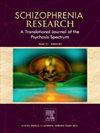Adverse childhood experiences, social functioning deficits and comorbid clinical symptoms among individuals with psychotic disorders: A prospective cohort study
IF 3.5
2区 医学
Q1 PSYCHIATRY
引用次数: 0
Abstract
Adverse Childhood Experiences (ACEs; e.g., sexual and physical abuse, exposure to intimate partner violence) are significant risk factors for developing psychosis and persistent psychotic disorders. Limited research has explored the influence of ACEs on the social functioning and comorbid clinical symptoms (depression, anxiety, and substance misuse) of individuals with psychotic disorders (PD) throughout their illness. This prospective cohort study aimed to determine whether the social functioning deficits and comorbid clinical symptoms of people with psychotic disorders varied over one year after psychiatric hospital admission, depending on the presence or absence of ACEs. Between 2012 and 2020, data were gathered by the Signature Biobank of the Institut Universitaire en Santé Mentale de Montréal for individuals hospitalized for psychotic symptoms (N = 970). Self-reported measures were used at four measurement times. Findings from the mixed-effects model for repeated measures revealed lower global social functioning and higher scores of depression, anxiety, and substance misuse over time for the psychotic disorder group with ACEs compared to the psychotic disorder group without ACEs. Implications for psychosis treatment with trauma-informed adaptations are discussed.
精神障碍患者的不良童年经历、社会功能缺陷和共病临床症状:一项前瞻性队列研究
不良童年经历;例如,性虐待和身体虐待,暴露于亲密伴侣暴力)是发展为精神病和持续性精神障碍的重要危险因素。有限的研究探索了ace对精神障碍(PD)患者在整个疾病过程中的社会功能和共病临床症状(抑郁、焦虑和药物滥用)的影响。这项前瞻性队列研究旨在确定精神障碍患者的社会功能缺陷和合并症临床症状在精神病院住院一年后是否因ace的存在或不存在而发生变化。在2012年至2020年期间,蒙特里萨大学心理研究所的特征生物银行收集了因精神病症状住院的个体的数据(N = 970)。自我报告的测量方法在四次测量中使用。重复测量的混合效应模型的结果显示,与没有ace的精神障碍组相比,有ace的精神障碍组的整体社会功能较低,抑郁、焦虑和药物滥用得分较高。讨论了创伤知情适应对精神病治疗的影响。
本文章由计算机程序翻译,如有差异,请以英文原文为准。
求助全文
约1分钟内获得全文
求助全文
来源期刊

Schizophrenia Research
医学-精神病学
CiteScore
7.50
自引率
8.90%
发文量
429
审稿时长
10.2 weeks
期刊介绍:
As official journal of the Schizophrenia International Research Society (SIRS) Schizophrenia Research is THE journal of choice for international researchers and clinicians to share their work with the global schizophrenia research community. More than 6000 institutes have online or print (or both) access to this journal - the largest specialist journal in the field, with the largest readership!
Schizophrenia Research''s time to first decision is as fast as 6 weeks and its publishing speed is as fast as 4 weeks until online publication (corrected proof/Article in Press) after acceptance and 14 weeks from acceptance until publication in a printed issue.
The journal publishes novel papers that really contribute to understanding the biology and treatment of schizophrenic disorders; Schizophrenia Research brings together biological, clinical and psychological research in order to stimulate the synthesis of findings from all disciplines involved in improving patient outcomes in schizophrenia.
 求助内容:
求助内容: 应助结果提醒方式:
应助结果提醒方式:


